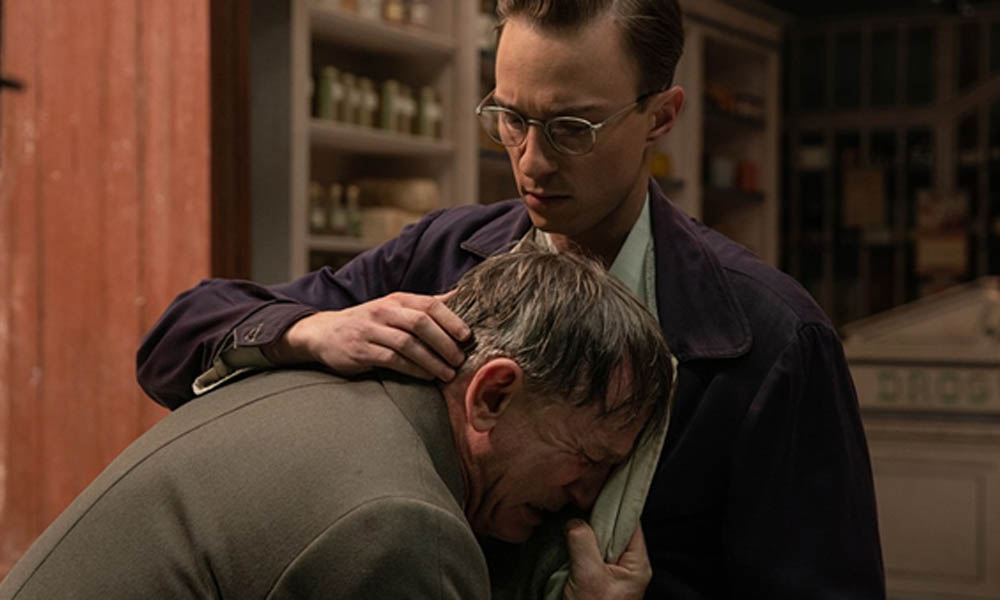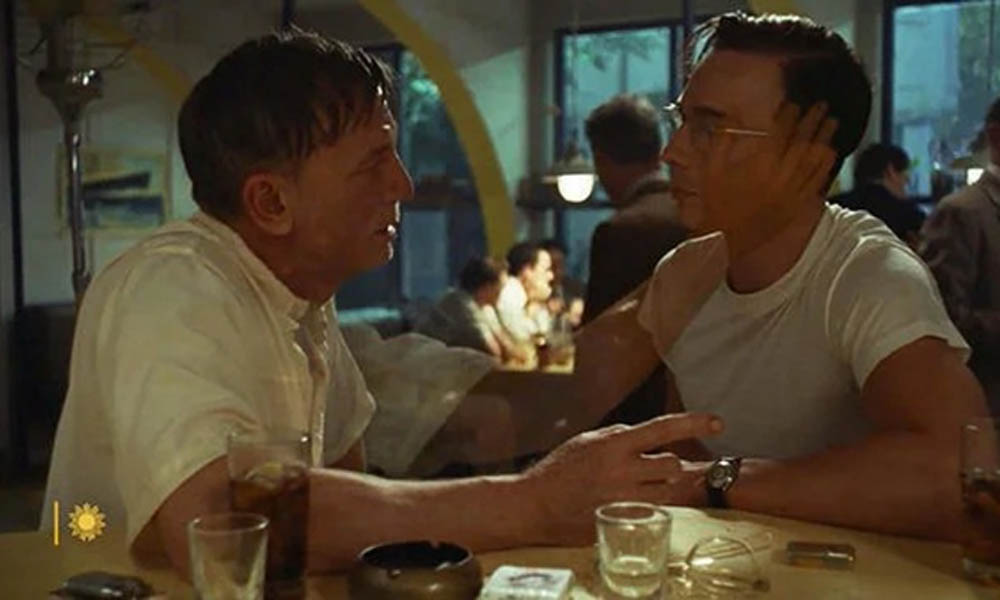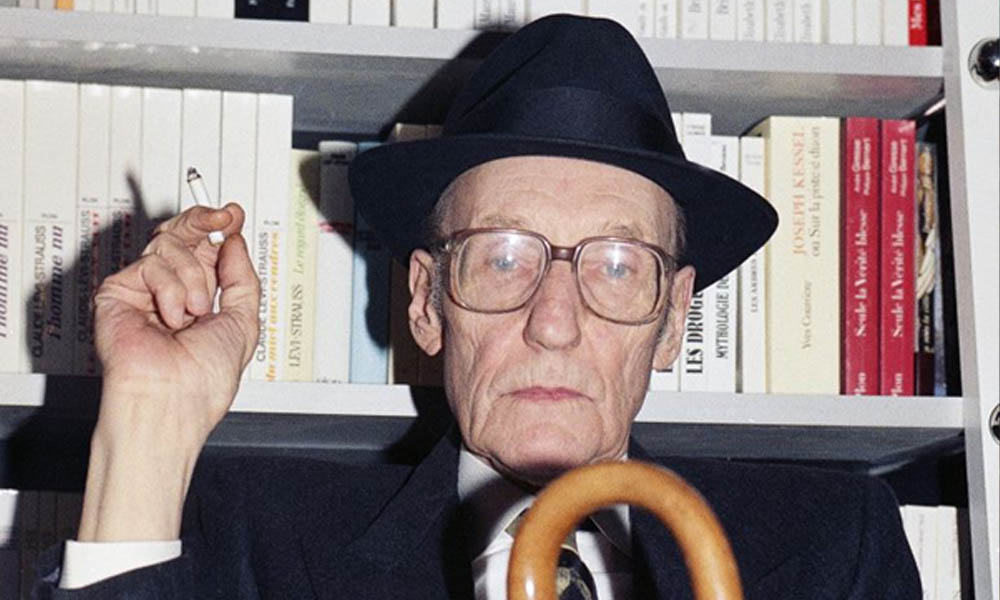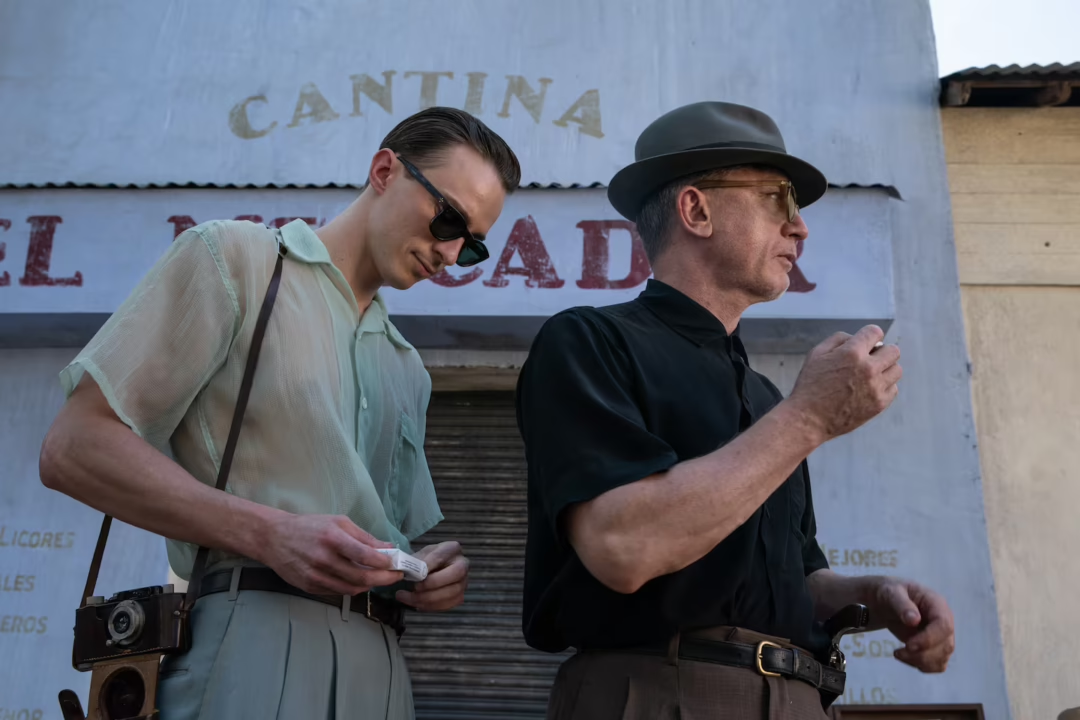I didn’t watch this one, but I had a good friend send in a review. When we meet up we usually talk about horror movies, but he sent in a review of Queer instead. I know it’s not our usual cup of tea, but all movies get a chance here at the Last Movie Outpost. Also, we love reviews from different people. We had an Oscar Watcher review of Queer. Here is another take, so Nick, over to you.
A Film About Queer Male Love And Grief
To anyone interested in viewing this film the first thing I would strongly suggest is to read William Burroughs’s first two short books Junkie and Queer. A lot of the negative reviews are from people who don’t understand the story I don’t think this is due to bad storytelling but because Queer is actually a sequel to Junkie even though there has never been a film adaptation for Junkie.
The books help you gain an understanding of the background, era. beatnik culture. and especially the epilogue of the story which I will go into later.
The film is directed by Luca Guadagnino (Call Me by Your Name and Challengers) and is set in 1950. William Lee (Daniel Craig), who is a fictionalized version of William Burroughs, is an American expat in Mexico City. He spends his days almost entirely alone, except for a few contacts with other members of the community.
His encounter with Eugene Allerton (Drew Starkey), an expat former soldier, shows him that it might be finally possible to establish an intimate connection.

I Want To Talk To You. Without Speaking
This film, to me, is about identity, addiction, love, and grief. It gave such power to the words of the book that it was captivating and electrifying.
Lee first sees Allerton in a Mexico City street whilst watching some cockfighting to the tune of Nirvana’s Come as You Are. Lee is immediately obsessed with Allerton and sets to get to know him. Mexico City is so beautiful. Filmed on set in Cinecittà Studios, Rome, Italy, it captures such an iconic, vibrant, and colorful look. It’s truly a mastery of art. It’s something that will stay with me.
What follows is a set of very awkward (but very funny to the viewer) interactions. For all his writing, Lee isn’t particularly good at talking to people. Allerton expresses an interest in the gay scene but it’s unclear to Lee and his friends if Allerton is gay. To confuse matters Allerton has a close lady friend – Mary.
Lee takes Allerton to the cinema and they go for dinner where he opens up about being a homosexual. This is one of the best scenes in the film, it starts with how he first realized he was gay and that the idea was destructive and how he thought of himself as being lesser and a “sex monster” because of it. This tirade is very homophobic but it’s important to address the views of the time and the legacy of the author.
Lee redeems himself by recalling a story from a “Wise old queen Bobo” who tells Lee to be proud of his identity and to conquer ignorance, prejudice and hate with knowledge, sincerity and love. Lee expresses his desire for love and companionship. Allerton seems to find this amusing and deep but not sure how to make of this.
The men share a disgusting Napoleon brandy together and share the night. This is a tender scene set to a beautiful score. Allerton shows his broken rib which becomes an obsessive part for Lee throughout the film.
The men are drinking the next day and Lee expresses his desire to search for Yagé, a plant said to offer telepathic abilities.

They develop a close bond and appear to live with each other for a while, this is one of the first times we see Lee just happy to be in the moment and not excessively drinking and abusing drugs. This is brief, as Allerton maintains an emotional distance from Lee and is often seen with Mary. Mary becomes a point of obstruction and frustration for Lee, who reminds Lee of his frustrating relationship with his dead wife.
Despite all of Lee’s attempts, Allerton becomes more and more distant. Lee gets desperate, fearing losing Allerton altogether. He decides to get blind drunk and drunkenly expresses his love for Allerton, despite Lee’s obvious desire for connection. The line “I want to talk to you. Without speaking” is so iconic but this attempt is laughed at by everyone… and then Lee proceeds to pass out.
After Lee’s failed attempt, he decides to try one more ploy, an all-expenses paid trip to South America which Allerton can leave any time. The only condition is they spend two nights together.
Allerton is reluctant but accepts the two men’s journey throughout South America. This is when their relationship becomes transactional and fraught with difficulty. Lee is a difficult man and very overbearing. Allerton seems to find Lee too much and gets annoyed when he tries to abuse his contract. Allerton enjoys the sites, and travel and does seem to reciprocate some of Lee’s affection some of the time.
The two men arrive in the Ecuadorian jungle to meet Dr. Cotter who has the latest research on Yage. Dr Cotter is played by Lesley Manville.
Lesley Manville plays such an iconic supporting character. Dr Cotter is an eccentric, paranoid scientist who lives in the jungle its reminiscent of a sweaty Colonel Kurtz. She has such an aura of unpredictably haphazardly waving firearms at the two men most of the time. She is protective of her research and is wary of the men at first. She warns of the power of ayahuasca brewed from yage.
Lee expresses that he wishes to form a telepathic connection and closeness to Allerton. Dr Cotter is supportive of this and wants to see the men’s relationship deepen so she agrees to brew the ayahuasca for the men.
What follows is a hallucinatory, fantastic scene that is like something out of David Lynch’s Naked Lunch, probably the best-known film adaptation of Burroughs’ work. Lee and Allerton experience vivid hallucinations from the drug. They vomit out their hearts in a bloody sack that bleeds and beats together, shocking but symbolic.
The men communicate telepathically in a scene filled with so much chemistry it feels very very well done. In Lynch fashion, they meld their bodies together. Allerton tells Lee:
“I’m not queer. I’m disembodied”
Which Lee had said in one of his dreams. This might seem out of place but this change does fit the tone and direction of the story but can be quite sudden as its so close to the end.
The next morning, Dr. Cotter suggests the men stay to further explore the effects of yage as they are forming a connection. However, shaken by the experience, Allerton is keen to leave, and Lee follows. Allerton seems uncomfortable in what he sees in himself and with his connection with Lee. He abandons Lee, not able to face his identity.
The last chapter is set two years later, a grief-stricken Lee is living a sad life full of drink and drugs and no one in his life. Lee returns to Mexico City.
He is told by his friend Joe, who is a fictionalized version of Allen Ginsburg, that Allerton has taken another trip to South America as a guide for an army colonel. Furthermore, he has not been seen or heard from since. Allerton gave the impression that Lee and he were still speaking even though they were not.
This seems to destroy Lee and I’ll cover the ending at the bottom of the page.
Book Vs. Film
I’ll briefly address the book and film, to me the book interested me as a gay man… but not due to its identity as queer book despite its title.
I found it interesting as a historical piece originally written in 1952, but not published till 1985 due to its “controversial” and “obscene” content as viewed at the time. It featured a variety of male queer relationships.
When I read it, I was fascinated by the openness of the relationships of ex-pat Americans in 1950s South America who could find things there that they could never in conservative 1950s America. However, I never read it as a love story, but more of a travel journal.

The relationship between the men feels transactional and very, very one sided in Lees favour. The book does not capture the tenderness or chemistry of the men, unlike the film which does it justice.
The book is also very problematic. I found the writing so interesting as it was so open and honest to a point where it is uncomfortable. The book, to me, holds an interesting piece in queer history. It’s language was very homophobic just like many other examples of Beat literature. Despite the author having sexual relations with many men it seemed Burroughs struggles with his identity as an outsider.
Burroughs often feels like an outsider who, later in life, wanted to conform. A sad fate for the “The Black Pope”.
Ending- A Farewell To Burroughs and Beatniks
The ending is confusing but I’m going to put my own spin on it. After Lee finds out the latest on Allerton it seems to destroy him, that he was so close all this time but chose to keep distant. Lee can’t seem to respect Allerton’s choices and can’t move on without him.
Lee then goes to a hotel and into the same room where he has had encounters with other men. He struggles to sleep and gets up to find a model of the hotel which he looks through. Lee finds himself aimlessly walking down a corridor where his huge eye is looking at him through the model.
Lee enters a room to find a snake eating itself in the shape of infinity. I think this is representing that love can be forever but selfish as the snake is eating itself. The snake is also crying, showing Lee’s grief.
Allerton engages Lee in a round of William Tell by placing a glass on his head. Lee shoots Allerton in the head, then holds his body until it vanishes, before he vanishes himself. He does this in a way without talking or hesitation.
The William Tell incident is very important, William Burroughs killed his first wife, Joan Vollmer, by playing a tragic game of William Tell. This is always what prompted Burroughs to write and is an important part of the Burroughs legacy. Their marriage was not a happy one, but he always grieved her, Burroughs grief always seeps into his work.

This scene, to me, shows that Lee is grieving Allerton and that by killing him he can try to put his obsession behind him.
Lee finds himself in his hotel room reflecting now an elderly man. He revisits his old room, to me I think of this as explaining the story and film as a memory of Lee reminiscing on his love. Lee then is lying on his bed, a still-youthful Allerton joins and cradles him and he shares a very sweet tender moment before shearing his last breath with his love.
To me this was the first mature queer love story I have seen on screen, its uncomfortable, ugly but tender. The ending to me highlights that we can conquer ignorance, prejudice and hate and we must make a society where people can express their identity openly, so they have healthy and loving relationships.
The film also shows the cost of conformity and to me how important it is we preserve individual identity.
The film has addressed its relationship with the past and Burroughs’s memory and legacy. A troubled man has finally found the peace that he could never have in his time.
Queer is 5/5, but read the two short stories first!







